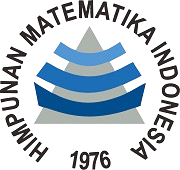Mathventure SPLDV : Developing an Educational Math Game to Improve Students’ Critical Thinking Skills
DOI:
https://doi.org/10.30736/voj.v7i2.1243Keywords:
Educational Game, Critical Thinking Skills, Learning Media, SPLDVAbstract
This study aims to develop and evaluate Mathventure SPLDV, an Android-based educational game to enhance eighth-grade students’ critical thinking on Systems of Linear Equations in Two Variables. The study used the ADDIE model in a Research and Development (R&D) approach. Data were collected using questionnaires and essay tests, and analyzed using a paired samples t-test after meeting normality and homogeneity assumptions. Validation from media and material experts showed high validity (87.78% and 93.63%), while student and teacher responses showed high practicality (89.26% and 96%). A significant improvement in critical thinking was found (t = 2.638 > 1.6698), indicating H₀ rejection. Based on the results, Mathventure SPLDV is recommended for classroom use as an effective tool to support students’ critical thinking
Downloads
References
Agustiani, S., & Jailani, J. (2023). Pengaruh Pendekatan Contextual Teaching and Learning Terhadap Hasil Belajar, Kemampuan Komunikasi Dan Berpikir Kritis Siswa. AKSIOMA: Jurnal Program Studi Pendidikan Matematika, 12(2), 2253. https://doi.org/10.24127/ajpm.v12i2.6118
Ailiyyah, E. T., Pambudi, D. S., Fatekurohman, M., Kurniati, D., & Susanto. (2024). Development of LSLC-Based Collaborative Learning Model Learning Tools and Their Effects on Critical Thinking Skills. VYGOTSKY, 6(2), 71–86. https://doi.org/10.30736/voj.v6i2.1014
Aizikovitsh, E., & Amit, M. (2010). Evaluating an infusion approach to the teaching of critical thinking skills through mathematics. Procedia - Social and Behavioral Sciences, 2(2), 3818–3822. https://doi.org/10.1016/j.sbspro.2010.03.596
Akbar, S. (2013). Instrumen Perangkat Pembelajaran. Bandung: PT Remaja Rosdakarya.
Angelelli, C. V., Ribeiro, G. M. de C., Severino, M. R., Johnstone, E., Borzenkova, G., & da Silva, D. C. O. (2023). Developing critical thinking skills through gamification. Thinking Skills and Creativity, 49. https://doi.org/10.1016/j.tsc.2023.101354
Astuti, A. P., Aziz, A., Sumarti, S. S., & Bharati, D. A. L. (2019). Preparing 21st Century Teachers: Implementation of 4C Character’s Pre-Service Teacher through Teaching Practice. Journal of Physics: Conference Series, 1233(1). https://doi.org/10.1088/1742-6596/1233/1/012109
Cicchino, M. I. (2015). Using game-based learning to foster critical thinking in student discourse. Interdisciplinary Journal of Problem-Based Learning, 9(2). https://doi.org/10.7771/1541-5015.1481
Ebner, M., & Holzinger, A. (2007). Successful implementation of user-centered game based learning in higher education: An example from civil engineering. Computers and Education, 49(3), 873–890. https://doi.org/10.1016/j.compedu.2005.11.026
Efendi, A. (2022). Improve Critical Thinking Skills with Informatics Educational Games. Journal of Education Technology, 6(3), 521–530. https://doi.org/10.23887/jet.v6i3.486
Ennis, R. H. (2011). The Nature of Critical Thinking: An Outline of Critical Thinking Dispositions and Abilities i (Vol. 1). University of Illinois.
Ersen, Z. B., & Ergul, E. (2022). Trends of Game-Based Learning in Mathematics Education: A Systematic Review. International Journal of Contemporary Educational Research, 9(3), 603–623. https://doi.org/10.33200/ijcer.1109501
Fadhilah, R., Sujadi, I., & Siswanto. (2021). The Critical Thinking Process of Senior High School Students in Problem-Solving of Linear Equations System. IOP Conference Series: Earth and Environmental Science, 1808(1). https://doi.org/10.1088/1742-6596/1808/1/012063
Fatimah, A. S., & Santiana, S. (2017). Teaching In 21st Century: Students-Teachers’ Perceptions of Technology Use In The Classroom. Script Journal: Journal of Linguistic and English Teaching, 2(2), 125. https://doi.org/10.24903/sj.v2i2.132
Firdaus, I., & Kailani, M. (2015). Developing Critical Thinking Skills of Students in Mathematics Learning. In Journal of Education and Learning (Vol. 9, Issue 3).
Frydenberg, M. (2011). Learning for 21 st Century Skills. In International Conference on Information Society (i-Society 2011).
Halpern, D. F., & Dunn, D. S. (2021). Critical Thinking: A Model of Intelligence for Solving Real-World Problems. Journal of Intelligence, 9(2), 22. https://doi.org/10.3390/jintelligence9020022
Ismail, S. N., Muhammad, S., Omar, M. N., & Shanmugam, S. K. S. (2022). The Practice of Critical Thinking Skills in Teaching Mathematics: Teachers’ Perception and Readiness. Malaysian Journal of Learning and Instruction, 19(1). https://doi.org/10.32890/mjli2022.19.1
Khusna, A. H., Siswono, T. Y. E., & Wijayanti, P. (2024). Research trends in critical thinking skills in mathematics: a bibliometric study. International Journal of Evaluation and Research in Education, 13(1), 18–30. https://doi.org/10.11591/ijere.v13i1.26013
Laar, E. van, Deursen, A. J. A. M. van, Dijk, J. A. G. M. van, & Haan, J. de. (2019). Determinants of 21st-century digital skills: A large-scale survey among working professionals. Computers in Human Behavior, 100, 93–104. https://doi.org/10.1016/j.chb.2019.06.017
Lestari, S., Agung, L., & Musadad, A. (2019). Android Based Adventure Games to Enhance Vocational High School Students’ Critical Thinking Skills in Proceedings of the 1st Seminar and Workshop on Research Design, for Education, Social Science, Arts, and Humanities. 3–8. https://doi.org/10.4108/eai.27-4-2019.2286917
Maghfiroh, F., & Dasari, D. (2023). Students’ mathematical critical thinking through the conceptual change approach. Jurnal Riset Pendidikan Matematika, 10(2), 128–138. https://doi.org/10.21831/jrpm.v10i2.62812
Mao, W., Cui, Y., Chiu, M. M., & Lei, H. (2022). Effects of Game-Based Learning on Students’ Critical Thinking: A Meta-Analysis. Journal of Educational Computing Research, 59(8), 1682–1708. https://doi.org/10.1177/07356331211007098
Downloads
Published
How to Cite
Issue
Section
License
Copyright (c) 2025 Dinda Agnes Permatasari, Sri Subanti, Ikrar Pramudya

This work is licensed under a Creative Commons Attribution-NonCommercial-ShareAlike 4.0 International License.
Copyright:
Authors who publish their manuscripts in this Journal agree to the following conditions:
- Copyright of any article on Vygotsky: Jurnal Pendidikan Matematika dan Matematika is held solely by the author under the Creative Commons Attribution 4.0 International license (CC BY NC SA).
- Authors can submit papers separately, arrange non-exclusive distribution of manuscripts that have been published in this journal into other versions (e.g. sending to the author's institutional repository, publication in a book, etc.) by acknowledging that the manuscript has been published for the first time in Vygotsky: Jurnal Pendidikan Matematika dan Matematika.
License:
Vygotsky: Jurnal Pendidikan Matematika dan Matematika is published under the terms of the Creative Commons Attribution 4.0 International License (CC BY NC SA). This license permits anyone to copy and redistribute this material in any form or format, compile, modify and develop this material for any purpose as long as it is not for commercial purposes. Additionally, anyone must provide credit and distribute contributions under the license of the creator of the original work.







